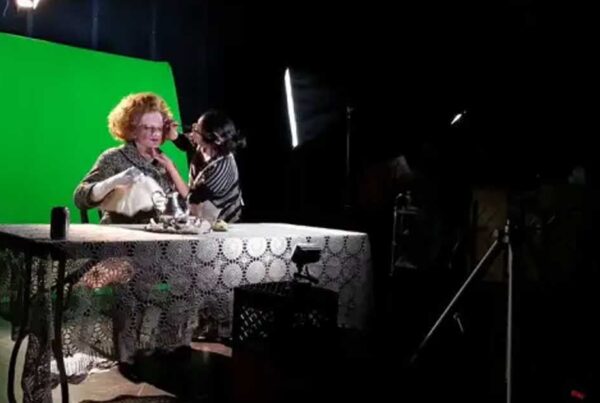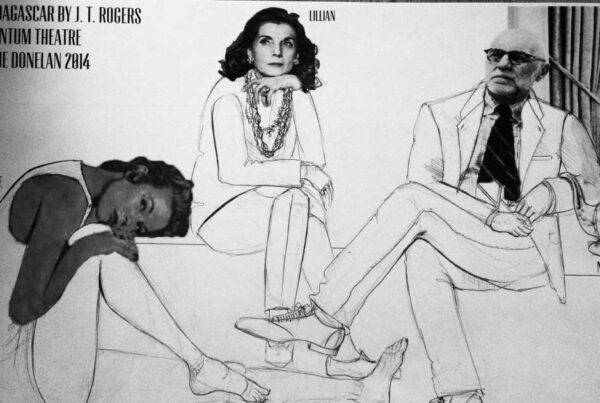T here’s a tyrant. There’s an underground revolutionary movement. There’s a bumbling intellectual and an accidental revolution. There’s farce and absurdity and biting commentary on the state of the world. There’s also the name: Pantagleize.
here’s a tyrant. There’s an underground revolutionary movement. There’s a bumbling intellectual and an accidental revolution. There’s farce and absurdity and biting commentary on the state of the world. There’s also the name: Pantagleize.
And that’s about where the literal connections end between Michel de Ghelderode’s 1931 “farce to make you sad” and Quantum Theatre’s production of Pantagleize, adapted by Jay Ball. Ball’s version situates an aging American poet in an unnamed Eastern European country, one in which the president is cracking down on dissent and insurgency is beginning to brew. Loosely based on Allen Ginsberg’s “King of May” trip to Prague in 1965, Pantagleize’s arrival to be crowned Král května sparks revolution when the poet inadvertently speaks the secret phrase. What happens next is absurd, devastating, hilarious, and strikingly relevant to our own world—sometimes all in the same line.

Jay Ball, Playwright
“[This story] took months of intellectual haggling,” Ball says. He had been approached by veteran director Jed Allen Harris to adapt de Ghelderode’s play on the strength of their past collaborations: Pantagleize is their fourth work together, and the two artists previously joined forces to bring Quantum’s 2010 production of The Task to the stage. “For [the character of] Pantagleize, we saw Ginsberg as representing what was best about the American ‘60s, but also what was most foolish and narcissistic, qualities Pantagleize seems to embody.”
The setting of Pantagleize is never stated, but it could be Kiev or Sevastopol as easily as Prague. “We never specifically refer to Prague or the Czech language,” Balls explains. Despite Ginsberg’s historical inspiration and the chunks of Czech dialogue scattered throughout the play, Ball says that he and Harris “want to give the show an opportunity to comment on and absorb parallel places” like the Ukraine or even the revolutionary centers of the Arab Spring.
Ball himself was in Prague during the 1989 Velvet Revolution, which later saw the division of Czechoslovakia into two post-Soviet republics. He taught English in Slovakia in the early ‘90s, during the country’s breakup, and changed his field of study from international relations to theater because of Václav Havel, absurdist playwright and last president of Czechoslovakia. For Ball, Pantagleize “is drawing on memories of what was hopeful about the revolution—and what became ugly as the country split in two.”
Pantagleize, Harris reminds us, “is in the world of farce. Large, outsized characters—but believable at the same time.” The play takes liberties with chronology as well as geography, flipping the bird to space-time. Muammar Gaddafi, Augusto Pinochet and Margaret Thatcher appear alongside references to Glen Beck, Syria, and the Ukraine. “The time period is fluid,” says Harris. “And purposefully so. We’re more interested in the ideas than the time frame. We’re working across a lot of borders.”

Max Pavel, Tony Bingham, and Lisa Ann Goldsmith
Ball agrees: “For the play being ‘unstuck in time’…this refers to that unsteady mixture of cultural memory and CNN headlines that are inside every American’s mind.”
Like the unwitting Pantagleize, audiences are thrust into a foreign world: strange characters speak a language you don’t know, political and cultural forces are at play that you don’t understand, but by the end—like the sad poet, the King of May—you’ve learned something. And you won’t look at the world the same way again.
Actually, it really happened. I am very pleased with Buy Valium them, despite the fact that they cause drowsiness during the day.
See Pantagleize premiere at the Lexington Technology Center in N. Point Breeze, April 11 through 27. Get your tickets now at www.quantumtheatre.com—because the revolution will not be televised.
Watch the Pantagleize trailer here:




